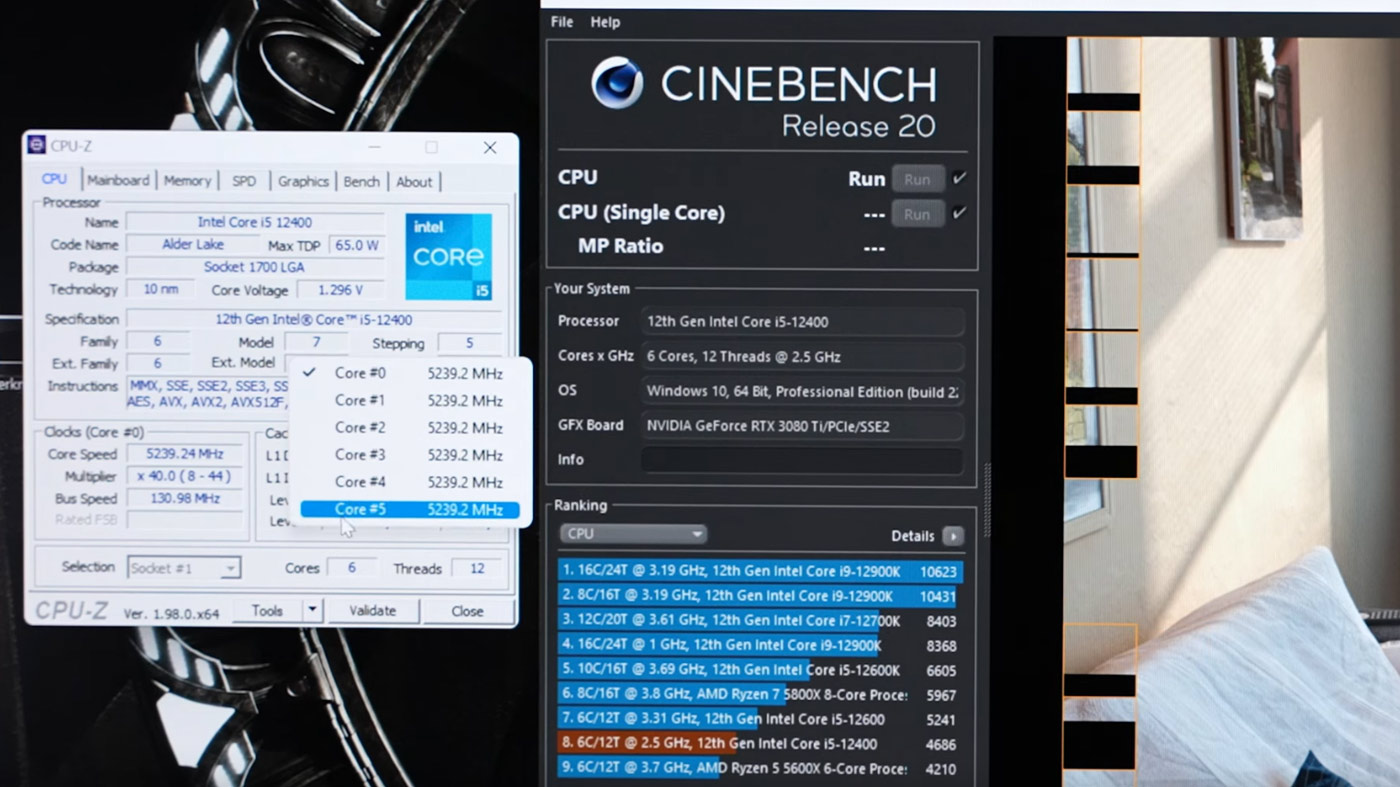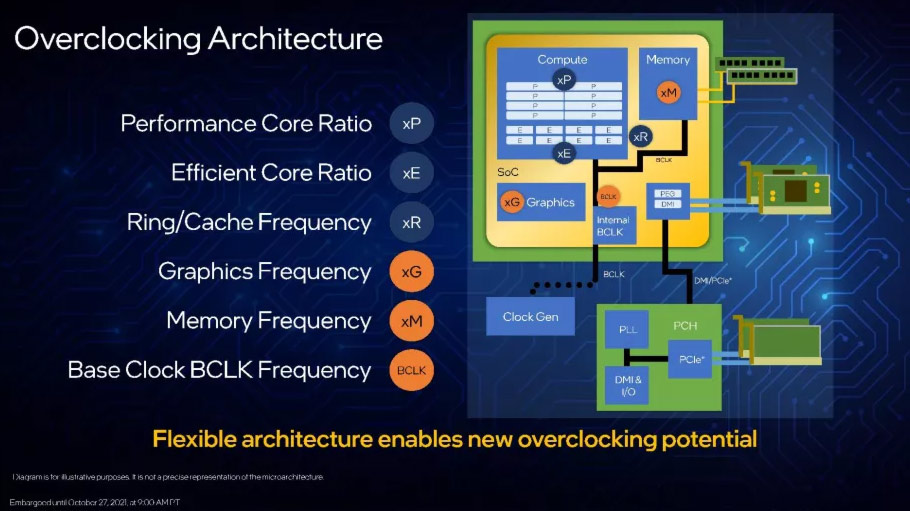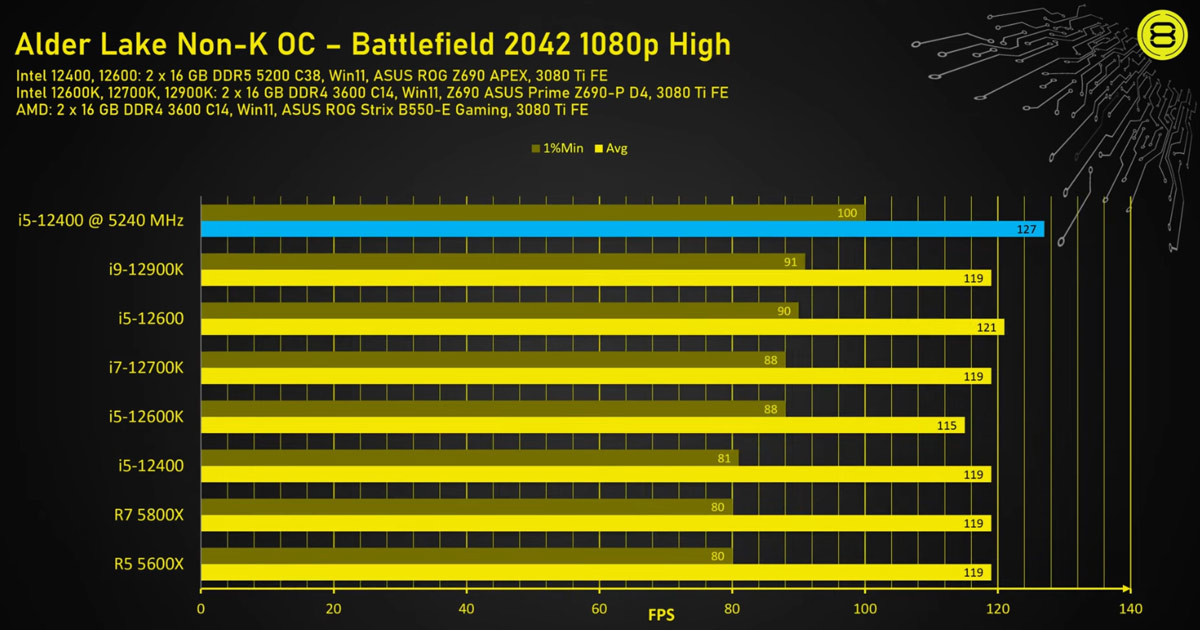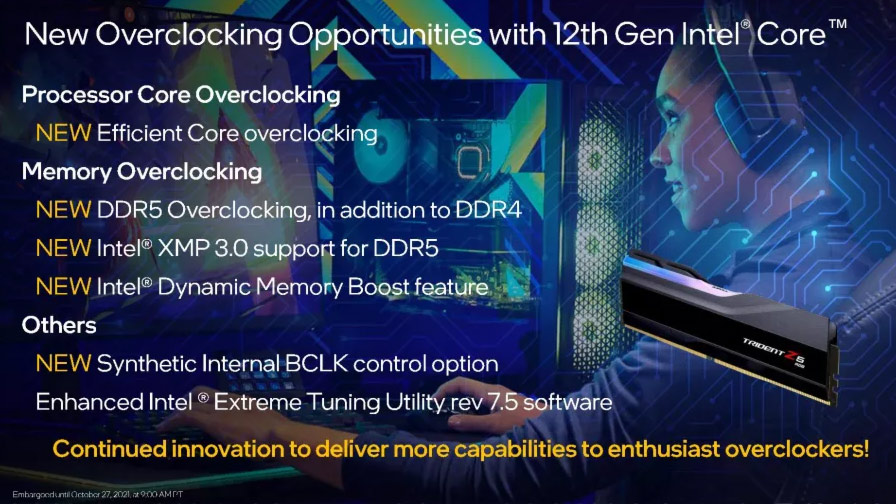Overclocker Shows How to Overclock Locked Alder Lake CPUs
33% higher performance on the Core i5-12400
Overclocking expert and YouTuber der8auer published a fascinating video this weekend in which he demonstrated BCLK overclocking on some of Intel's latest Alder Lake non-K processors. The newfound ability of these processors, popular known as 'Locked' CPUs, can provide performance boosts of up to 33% after just five minutes of BIOS tweaking. Furthermore, a humble overclocked Intel Core i5-12400 can leave many higher-end chips like the Core i9-12900K in the dust in some games.
To begin his video presentation showcasing his discovery, der8auer, a.k.a Roman Hartung, shows off some very attractive overclocking stats for the Intel Core i5-12400, giving us a taste of the clock speeds and performance uplift we might expect.

Naturally, this needs some explanation, as Intel's 'K' series processors are usually the only products that allow for adjustments in overclocking attempts for base clock (BCLK). For the last few generations, non-K chips have been restricted to memory overclocking only. However, this is not the case in these CPUs/motherboards tested in the embedded video.
With the introduction of Alder Lake, Intel introduced many more granular CPU overclocking controls and features. For example, it has opened up options to overclock the E-and P-cores separately, with adjustable parameters covering various voltages, ring/cache frequency, graphics, memory, and BCLK overclocking. In addition, a new 'synthetic BCLK' facilitates adjustments on motherboards that don't have an external clock generator. As well as these features being present in new motherboard BIOS UIs, you should be able to access them in the updated Intel XTU software v7.5 or greater.

Getting back to the video action, der8auer talks viewers through the adjustments necessary to overclock processors like the Intel Core i5-12400/F and i5-12600 on the Asus ROG Maximus Z690 Apex motherboard. Tweaks across several entries in the Extreme Tweaker pages in the BIOS were needed to make sure the system boots and was stable (please refer to the video). Der8auer also lets interested watchers know which parameters to adjust to test the comfortable clock and voltage limits of the processor that you bought – in other words, to try your luck in the silicon lottery. Of course, the most important thing here is that a setting in the Extreme Tweaker > Tweaker's Paradise options allows you to select a drop-down menu to toggle Unlock BCLK OC to 'Enabled.'
The sample of the Core i5-12400 featured in the video allowed for BCLK overclocking with bus speed set to 131 MHz, with the voltage set to 1.370V, managing to run all cores at 5,240 MHz – and this is not a readout error.
In early testing of various non-K processors, it seems to be the case that lower echelon parts such as the Core i5-12400/F will have the best OC potential, as long as the silicon lottery is fair to you. Therefore, der8auer decided to run several synthetic productivity tests and gaming benchmarks with this processor. He apologized for more significant variances in testing platforms than usual. However, these results are still worthy of attention, with the uplifts observed in the standard over OC systems clear to see. Also, as per our headline and introduction, in some popular games, the relatively humble Core i5-12400 could beat the likes of the stock clocked Core i7-12700K or Core i9-12900K.
Get Tom's Hardware's best news and in-depth reviews, straight to your inbox.

Overall, it is pretty ironic how good these non-K Alder Lake processors are at overclocking. With the extra voltage required and resulting 5 GHz+ clocks, the heat wasn't even an issue, in general, but this will depend on your cooling solution. However, these were outstanding results for "five minutes of work" tweaking the processors.
To conclude his video, dr8auer postulated on the possibility of enabling 'Unlock BCLK OC' on other motherboards from Asus and other brands. He had only two successes, with the above-mentioned Asus ROG Maximus Z690 Apex and the Asus ROG Maximus Z690 Hero. He noted two failures; the Asus ROG Strix Z690-I Gaming Wi-Fi and the Asus TUF Gaming B660M-Plus D4. De8auer wondered whether an external clock generator on the motherboard might be one particular requirement separating the Asus Unlock BCLK OC feature availability.
However, Intel said an external clock generator would not be necessary for ADL-S overclocking last October. It introduced a new 'synthetic BCLK' feature that allows BCLK adjustments on motherboards that don't have such hardware.

It will be fascinating to see how Intel ADL-S non-K overclocking develops with other motherboard makers and BIOS updates arriving. Fingers crossed, Intel and its partners will make the feature more accessible rather than try and sweep it under the carpet.

Mark Tyson is a news editor at Tom's Hardware. He enjoys covering the full breadth of PC tech; from business and semiconductor design to products approaching the edge of reason.
-
VforV ReplyFingers crossed, Intel and its partners will make the feature more accessible rather than try and sweep it under the carpet.
= disabled with the next BIOS update.
If intel would make it more accessible, would that not hurt their own K SKUs more?
Financially it make no sense to have this option (unless it remains as a gimmick for very few expensive Z boards), since they have this locked and unlocked differentiation between SKUs, not like AMD's Zen where you can OC any CPU on (almost) any motherboard and tier.
Intel likes segmentation and limitations. -
samopa ReplyVforV said:If intel would make it more accessible, would that not hurt their own K SKUs more?
The ADL K SKU has more overclocking potential than non K, mine can do 5.2 GHz on all P cores without tweaking anything except adjusting bclk ratio, everything else stock. Little bit tweaking on voltage side make it capable 5.4 GHz on all P core stable. -
escksu oh bclk. FSB overclocking used to be the only way because intel lock the multiplier on their cpu.Reply -
wifiburger it's interesting that he found this tweak but those boards are ddr5 & too expensive for even 12900KReply
and why would Asus auto hide/disable the bclk generator ? makes 0 sense -
VforV Reply
Are you sure it's not up to silicon lottery?samopa said:The ADL K SKU has more overclocking potential than non K, mine can do 5.2 GHz on all P cores without tweaking anything except adjusting bclk ratio, everything else stock. Little bit tweaking on voltage side make it capable 5.4 GHz on all P core stable.
Scenario1:
If they let non-K and K are able to OC on the same expensive MB, does it really matter if the K one OCs +100MHz when the non-K is so much cheaper?
Scenario2:
Or maybe we can see cases where the non-K actually OCs better, like it can happen with Zen CPUs (the non-X OC-ing better than the X CPU).
I would not be so sure if I were you.
I think this is an unusual situation, one that will be "corrected" soon by intel with BIOS updates. The same as they will take the 512 AVX away from AL, they will take this "happy accident" away too, unless they like to shoot themselves in the foot. -
LuxZg Something similar happened with Z170 & Skylake, so I went with i5 6400. Sure enough it was killed pretty fast via microcode updates and what not. So I was left with high end MBO and low end CPU. Worst thing is that getting used CPU for upgrade never because cheap enough, so I was stuck with that combo, literally new MBO+CPU would be better buy than a 2nd hand better CPU for Z170. Not going to do that again. Guys like debauer can afford playing with stuff, while I usually keep my system for years, so any bad bets will get me years of lower performance.Reply -
heickel.ramadhan Reply
maybe they should let the K sku to have e Core while non K has no e CoreVforV said:= disabled with the next BIOS update.
If intel would make it more accessible, would that not hurt their own K SKUs more?
Financially it make no sense to have this option (unless it remains as a gimmick for very few expensive Z boards), since they have this locked and unlocked differentiation between SKUs, not like AMD's Zen where you can OC any CPU on (almost) any motherboard and tier.
Intel likes segmentation and limitations.
ATM the non K i7 still have e Core
idk how intel will segment their product, adding eCore make paying more for K Sku justified since at least on i5, when u buy K sku, u not only get better bin, but also larger die chip -
Drazen BCLK overclocking is no problem at all on very CPU but how is with side effects?Reply
BCLK is 100MHz and all timings are calculated for 100MHz value, eg timers. -
InvalidError Reply
BCLK overclocking died when Intel tied PCIe and SATA clocks to the same clock generator which limited tweakability to 5-7%. Looks like they have been decoupled on Alder Lake so this no longer is an issue.Drazen said:BCLK overclocking is no problem at all on very CPU but how is with side effects?
